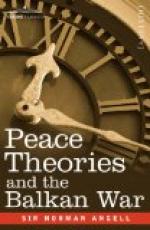Now if for this tragedy we “all have our responsibility,” then what becomes of his first statement that the war is raging despite all that rulers and diplomats could do to prevent it? If the war was “inevitable,” and rulers and diplomats have done all they could to prevent it, neither they nor we have any responsibility for it. He knows, of course, that it is impossible to deny that responsibility, that our errors in the past have been due not to any lack of readiness to fight or quarrel with foreign nations, but precisely to the tendency to do those things and our indisposition to set aside instinctive and reasonless jealousies and rivalries in favour of a deeper sense of responsibility and a somewhat longer vision.
But, again, this quite obvious moral, that if we have our responsibility, if, in other words, we have not done all that we might and have been led away by temper and passion, we should, in order to avoid a repetition of such errors in the future, try and see where we have erred in the past, is precisely the moral that Mr. Churchill does not draw. Again, it is not the popular line to show with any definiteness that we have been wrong. An abstract proposition that “we all have our responsibilities,” is, while a formal admission of the obvious fact also at the same time, an excuse, almost a justification. You realise Mr. Churchill’s method: Having made the necessary admission of fact, you immediately prevent any unpleasant (or unpopular) practical conclusion concerning our duty in the matter by talking of the “complacency” of those who would fix any real and definite part of the responsibility upon you. (Because, of course, no man, knows where lies, and no one would ever attempt to fix, the “sole” responsibility). Incidentally, one might point out to Mr. Churchill that the attempt to see the errors of past conduct and to avoid them in the future is not complacency, but that airily to dismiss our responsibility by saying that it is of “no consequence whether we sit in sackcloth and ashes” is complacency.
Mr. Churchill’s idea seems to be that men should forget their errors—and commit them again. For that is what it amounts to. We cannot, indeed, undo the past, that is true; but we can prevent it being repeated. But we certainly shall not prevent such repetition if we hug the easy doctrine that we have always been right—that it is not worth while to see how our principles have worked out in practice, to take stock of our experience, and to see what results the principles we propose again to put into operation, have given.




